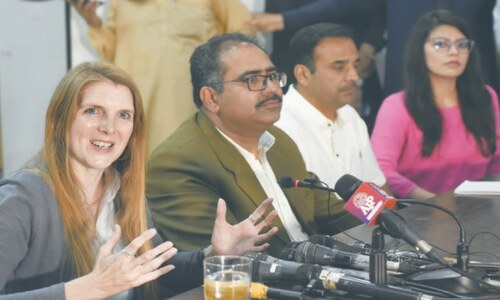‘Average’ students getting left behind

There are over a dozen degree colleges in the capital, but all of them have closed their doors to the average student, denying them their fundamental right to education.
There are six model degree colleges and 10 FG degree colleges in Islamabad, all of which have denied admission to students who scored below 45pc in their intermediate examinations.
The passing mark for the Federal Board of Intermediate and Secondary Education’s (FBISE) intermediate examinations is 33pc, but for the last three years, government-run degree colleges have not entertained the applications of students who scored below 45pc. The model colleges director, Dr Tariq Masood, told Dawn: “According to our policy, students who scored 45pc are eligible to apply for admissions.”
He said all Federal Directorate of Education (FDE) colleges are affiliated with Quaid-i-Azam University (QAU), which registered students who have scored 45pc.
Dr Masood admitted that while the passing percentage for intermediate examinations is 33pc, because all Islamabad colleges are affiliated with QAU “we cannot offer admission to students who got below 45pc [based] on the varsity’s requirement”.
Each year, hundreds of students score below 45pc, and have to leave college. Islamabad-based colleges were previously affiliated with Punjab University, and did not operate under a bar on admitting students who scored below 45pc.
“There are several private colleges affiliated with Punjab University. After being refused by our colleges, hundreds of students are forced to either enrol themselves in private institutions or give up on their education,” Federal Government College Teachers Association President Sagheer Mirani said.
“The government can’t deny students the right to education; the ministry of CADD should take up the matter,” Mr Mirani said.
“Either the passing percentage for intermediate should be 45pc, or some of our colleges should offer admissions to average students as well.”
Mr Mirani added that each year, a significant number of students who score between 45pc and 33pc are denied admission to government institutions, and private colleges in Rawalpindi and Islamabad are exploiting the situation.
Seminars on hereditary diseases

Experts at two seminar organised by QAU said that DNA testing, prenatal diagnosis and genetic counselling were vital to mitigate the impact of hereditary and genetic diseases in Pakistan.
Two seminars were organised by the university’s Department of Animal Sciences on Thursday, conducted by Turkish academic Prof Dr Asli Tolun from the Bogaziçi University in Istanbul.
According to a QAU spokesperson, Dr Tolun is a well-known human geneticist in the Mediterranean and European regions working on hereditary and rare genetic disorders.
“Hereditary and genetic diseases are common in Pakistan, as well as in Turkey, due to various common reasons, like consanguinity, early marriages, overlapping generations and large sibships. Hereditary diseases [have] a tremendous impact on the lives of the patients and their families and 3-6pc of the populations in developing countries are affected by such anomalies. Common hereditary disorders like beta-thalassemia, sickle cell anemia, hemophilia, mental retardation and deafness could be avoided by not having cousin marriages in families at risk,” Dr Tolun said.
At the inaugural sessions of the seminars, Dr Sajid Malik from the animal sciences department and Dr Amir Ali from the National Centre for Bioinformatics highlighted the importance of the seminar topic and its relevance the Pakistani health system and academics.
A number of faculty members and students attended the sessions. The visiting professor visited various research labs of the animal sciences department and the bioinformatics centre, and interacted with the faculty. She also had detailed meetings with Prof Dr Sarwat Jahan, the chairperson of the Department of Animal Sciences, Dr Wasim Ahmad, the dean of the Faculty of Biological Sciences and QAU Vice Chancellor Dr Javed Ashraf.
Published in Dawn, September 30th, 2016














































Dear visitor, the comments section is undergoing an overhaul and will return soon.